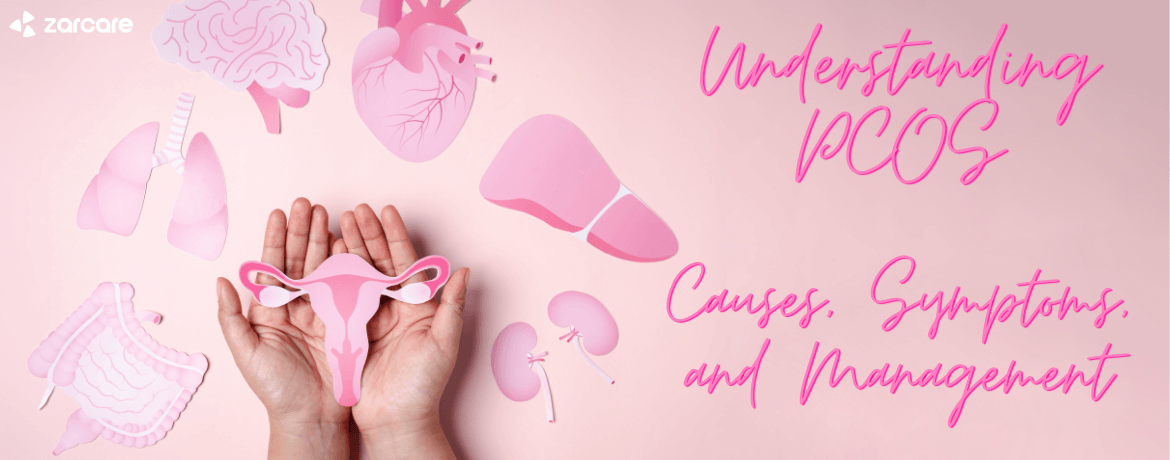Polycystic Ovary Syndrome (PCOS) is a common hormonal disorder that affects millions of women worldwide. It can impact reproductive health, metabolism, and overall well-being. Understanding its causes, symptoms, and management options can help individuals take control of their health.
Causes of PCOS
The exact cause of PCOS remains unknown, but several factors contribute to its development:
- Hormonal Imbalance: Excess androgens (male hormones) disrupt ovulation.
- Insulin Resistance: High insulin levels can increase androgen production, leading to symptoms like irregular periods and acne.
- Genetics: A family history of PCOS increases the likelihood of developing the condition.
Symptoms of PCOS
PCOS symptoms vary but commonly include:
- Irregular Menstrual Cycles: Infrequent or prolonged periods.
- Excessive Hair Growth (Hirsutism): Unwanted hair on the face, chest, or back.
- Acne and Oily Skin: Due to increased androgen levels.
- Weight Gain: Difficulty losing weight, particularly around the abdomen.
- Hair Thinning: Scalp hair loss similar to male-pattern baldness.
- Fertility Issues: Irregular ovulation can lead to challenges in conceiving.
Managing PCOS
While there is no cure for PCOS, lifestyle changes and medical interventions can help manage symptoms:
- Healthy Diet: A balanced diet with whole foods, fibre, and lean proteins can improve insulin sensitivity.
- Regular Exercise: Physical activity helps with weight management and reduces insulin resistance.
- Medications: Birth control pills regulate periods, and medicines like Metformin can improve insulin levels.
- Stress Management: Practices like yoga and meditation support hormonal balance.
When to See a Doctor
Consult a healthcare professional if you experience irregular periods, excessive hair growth, or difficulty conceiving. Early diagnosis and management can help prevent complications like type 2 diabetes and heart disease.
PCOS is a lifelong condition, but you can lead a healthy and fulfilling life with the right approach. If you suspect PCOS, take proactive steps and seek medical advice to manage your well-being effectively.
OTC Medicine to treat PCOS
There are several over-the-counter (OTC) medications and supplements that may help with polycystic ovarian syndrome (PCOS), including topical acne treatments, non-steroidal anti-inflammatory drugs (NSAIDs), and supplements like B vitamins, vitamin D, and fish oil.
Topical acne treatments
- Benzoyl peroxide (Benzac AC Gel, Clearasil, PanOxyl, Proactiv)
- Tretinoin (Retin A, Renova, Atralin)
- Adapalene (Differin)
- Erythromycin (AkneMycin)
- Clindamycin (Cleocin T)
- Sodium Sulfacetamide (Klaron)
Non-steroidal anti-inflammatory drugs (NSAIDs) include ibuprofen and aspirin.
Supplements
- B vitamins, particularly folate (B9) and vitamin B12
- Vitamin D
- Fish oil
- Inositol
- Magnesium
Other tips
- Non-steroidal anti-inflammatory drugs (NSAIDs) can help with moderate PCOS pain.
- Magnesium-rich foods, such as spinach, cashews, almonds, pumpkin seeds, and whole grains, can help with magnesium levels.
- The body better processes magnesium citrate or magnesium glycinate than magnesium oxide.
Some supplements may help with PCOS symptoms like acne, pain, hormonal balance, and fertility.
Where to seek help
If you’re looking for help for polycystic ovary syndrome (PCOS) in South Africa, you can consult:
Primary care doctor
- A good place to start, especially if you have questions or concerns
- Can recommend a specialist or start you on treatment
Specialist gynaecologist
- Can perform a full assessment and discuss symptoms and treatment options
- Can prescribe medication to reduce acne or hair growth
- Can perform surgery to reduce androgen-releasing tissue in the ovaries
Fertility clinic
- Can offer fertility treatments, such as intrauterine insemination (IUI) or in vitro fertilisation (IVF)
- Can provide psychological support and advice on managing the condition
Marie Stopes South Africa
- Offers health-management options, such as blood pressure and weight checks
- It has centres throughout the country that provide contraception methods for PCOS treatment.
Sources:
- Polycystic ovary syndrome (PCOS) – https://www.mayoclinic.org/diseases-conditions/pcos/symptoms-causes/syc-20353439
- Diabetes and Polycystic Ovary Syndrome (PCOS) – https://www.cdc.gov/diabetes/risk-factors/pcos-polycystic-ovary-syndrome.html
- The Best PCOS Supplements For Naturally Treating PCOS – https://www.allarahealth.com/best-pcos-supplements-for-naturally-treating-pcos

